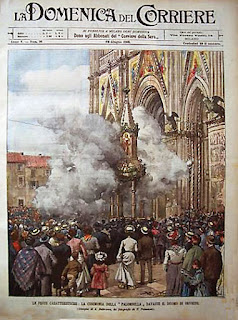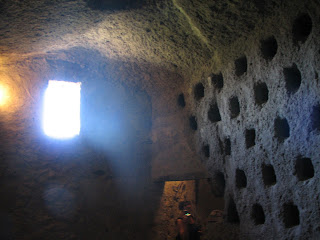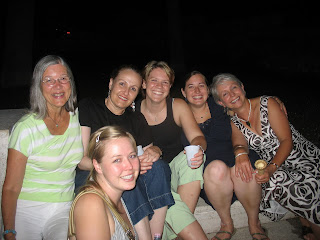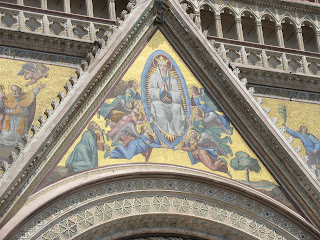Hello, again. As I said at the beginning of worship, it’s good to be back.
A few things before we begin our study of Romans 10 today. First, I have to admit to playing a rather cruel joke on Ron Poisel and Alec Brohnson - your supply pastors and my fill-ins while I was away on sabbatical. Because I wanted some continuity this summer in the preaching texts, plus to make things a little easier for Kylie while I was away, I made the choice to focus on the book of Romans. Well, I made the choice for them.
You see, Romans is considered one of the most challenging of Paul’s letters to figure out. It’s a theologically complex and very dense writing. Everyone struggles with it. So, I promise, there will not be a quiz at the end of the summer. And the truth is that I am getting a little payback because I, too, will be preaching in it for the next 4 weeks.
A second thing I want to say is that I can guarantee that some of my experiences on sabbatical will likely find their way into my preaching and conversation over these next few weeks. It was a wonderful experience. A time of rest and renewal of relationships for me. A time of exploration and travel. And I’m still processing some of it. But, expect to hear a little more about it. And, if I haven’t said it enough, thank you for allowing me the time away. I was more exhausted than I knew.
Then, lastly, I want to talk briefly about our understanding of Romans. Since the early church, we have digested this letter as Paul’s treatise on faith and justification and salvation. Since the time of the Reformation, we - especially we Lutherans - have understood it to hold the core message of justification by faith. It has become an understanding that more and more pulls verse out of their context to highlight the reality of sin and the necessity to confess Christ for one’s own personal salvation. One of the dangers of this is that it makes salvation all about the individual. And one’s personal relationship with Christ as a personal Lord and Savior.
Over the past 50 years, the understanding of Paul’s writing has changed. It’s called a “new” perspective on Paul. If considering a “new” understanding makes you a little uncomfortable, know that this began with the writings of Krister Stendahl - a Swedish Lutheran theologian who, it was a change in understanding that began with the writings of Krister Stendahl - a Swedish Lutheran theologian, who pointed out that Paul - a Jew - did not view his life as one of conflicted torment with a troubled conscience. Stendahl argued that “justification by faith” was not the heart and soul of Paul’s theology, but that only used this idea when circumstances arose to argue that both Jews and Gentiles stand on equal footing before God. Other theologians picked this up and ran with it - and it has changed the entire culture of the study of Paul’s writings. Because Paul’s writings have primarily to do with community and how Christ-followers are to live in community.
Now that’s a very long introduction to our reading today, which comes from the heart of Romans.
Moses writes about the righteousness that comes from the Law: The person who does these things will live by them. But the righteousness that comes from faith talks like this: Don’t say in your heart, “Who will go up into heaven?” (that is, to bring Christ down) or “Who will go down into the region below?” (that is, to bring Christ up from the dead). But what does it say? The word is near you, in your mouth and in your heart (that is, the message of faith that we preach). Because if you confess with your mouth “Jesus is Lord” and in your heart you have faith that God raised him from the dead, you will be saved. Trusting with the heart leads to righteousness, and confessing with the mouth leads to salvation. The scripture says, All who have faith in him won’t be put to shame. There is no distinction between Jew and Greek, because the same Lord is Lord of all, who gives richly to all who call on him. All who call on the Lord’s name will be saved.
So how can they call on someone they don’t have faith in? And how can they have faith in someone they haven’t heard of? And how can they hear without a preacher? And how can they preach unless they are sent? As it is written, How beautiful are the feet of those who announce the good news. (Romans 10:5-15 CEB)
One of the best times I had on sabbatical was on July 4th. I was able to spend time in Texas with my gathered immediate family - including my son, brother and sister-in-law, nieces, and my new grand-nephew - the first grandchild for my brother and his wife. And, yes, it was hot! But we were on a lake - so it was tolerable.
It was the first time in over 15 years that we had all been together. For my son and his cousins, it was a time of getting to know each other all over again as adults, each with their joys and struggles. For me, it was just good to be with family - and to experience each family member in their unique personalities.
There was a twinge of sadness, though. First, my niece’s husband, Coddie, wasn’t there. He died suddenly this past May of a heart attack. Then second, my nephew, Alex, also wasn’t there. He has been estranged from our family for several years. Although he has reconnected with his dad - my brother - he hasn’t yet come back into the family fold. So, there’s a little nick in my heart because of that.
Maybe you have something like that in your family. Maybe there’s someone who is estranged from the rest of your family. Maybe you’re the one who is estranged. I think this is more common than we know.
And this is really what Paul is writing about in this chapter and the surrounding ones, chapters 9 through 11 in Romans. He is expressing and working through his heartbreak over the Jewish people - HIS people. Wondering how it’s possible that Israel, God’s chosen people, have been given the promises in scripture and the covenant, yet are sitting on the sidelines while the Gentiles are flocking to Jesus as the Messiah. He writes at the beginning of chapter 9: I have great sadness and constant pain in my heart. I wish I could be cursed - cut off from Christ - if it helped my brothers and sisters, who are my flesh-and-blood relatives.
The resurrection of Christ was, for Paul, key. It is the beginning of God’s cosmic re-creation and reconciliation of humanity with God’s very self. Note that it is Christ’s resurrection - and not his death on the cross - that is key for Paul. Because, you see, anyone can die, even die on a cross. But, it is only Christ who was resurrected by God, which proves God’s faithfulness. That God keeps God’s word. God says what God will do.
At the very beginning of Romans, Paul writes that the gospel was “promised beforehand in the scriptures. Throughout the letter, Paul quotes from the Hebrew scriptures to show God’s hand - to show what God intended to do. It began with the Jewish people.
Yet, the most important principle of ancient biblical interpretation is this: what God has done in the present determines the meaning of what God said in the past. So, Paul’s conclusion is that all of scripture points to Christ as the Messiah. And that God’s ultimate solution to the problem of sin and the separation of humanity from God was Jesus.
But what about the Jews? That part, for Paul, is so hard to figure out. It’s the question he’s struggling with here. The early church was made up of the Jewish disciples. But as it has grown, more and more Gentiles - and not Jews - are flocking to Christ. Paul struggles with this. He is a Jews. The Jews are Paul’s peeps.
But they are largely uninterested in the idea that Jesus is the Messiah. So the early movement of Jesus-followers is full of Gentiles (in other words everyone else who is not Jewish). Paul is arguing and advocating that the Gentiles are to be included without requiring them to follow Jewish law or custom (like circumcision or keeping the Sabbath, even though these have been commanded in scriptures). So, if the Jews then aren’t joining up with this new movement, then this new movement is no longer only Jewish. And that creates, at least, 3 problems.
First, God. How can God be faithful to God’s own people if they aren’t enjoying the benefits of God’s great and final act of salvation in Christ? But, Paul argues that God is faith. And that God will keep God’s promises.
Second problem. On the ground. What are Gentiles to make of Jews? And vice versa? In Rome, Jews are returning after having been kicked out of the city 50 years earlier. There are Christian Jews returning to the community. People are having to learn how to live together. Or wondering if they even should. It’s like it’s a church potluck and half of the group won’t show up because Patty isn’t bringing her deviled eggs. Who gets to control things? Gentiles? Jews? What actions count as faithfulness and obedience to God? This is the question. What does faithfulness to God look like if the Gentiles aren’t required to follow the same scripture requirements?
Third. What are we to make of non-believing Jews? How do we understand their rejection of Jesus as Messiah? What is their future?
For Paul, it’s a work of navigation, balancing the promises of God to Israel with the reality that the Jewish people have largely not accepted Jesus as Messiah while, at the same time, numerous Gentiles have. For us, too, it matters. Because the Jewish people are God’s chosen people - that hasn’t changed because God is faithful to them. So, to reject the Jews as part of the family is to reject Israel’s God. Our God.
The bottom line is that everyone is in. Humanity was created to bear God’s image - to show the whole created order what God is like. And if God’s plan of salvation isn’t to restore all of humanity, then God’s got a big problem.
By the end of Romans, as we’ll learn, it’s not clear that Paul has everything all figured out. But, ultimately, he comes to a place of trust. Trusting that it is the resurrected Christ - and not obeying the commandments - that the law actually points us to.
And that we are to be the bearers of that good news. Good news that transcends all boundaries, all divisions, all borders - everything that we, as broken human beings, like to put in its way. “Neither Greek, nor Jew. Neither male, nor female. Neither heterosexual or transexual. Neither documented, nor undocumented. Neither slave, nor free.
This good news is about life. About the life that Christ’s resurrection - and not his death - points us to. About - together - experiencing the fullness of God. A God who, as Elijah experienced, comes not to us in the wind, or the earthquake, or even the fire. But in the most unexpected way. In the sound of sheer silence, through which God whispers to us: Y’all are mine. Y’all are enough. I choose y’all. I love y’all.
May we be the messengers of this good news.



















